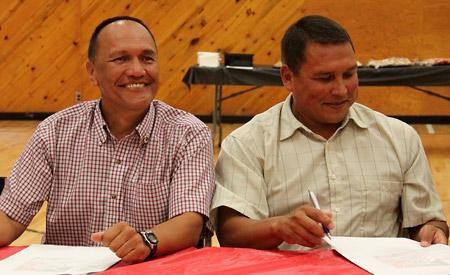Representatives from Tla’Amin (Sliammon) and Sechelt first nations came together in Sliammon on Wednesday, August 17 to sign a shared territory agreement between the two communities.
Tla’Amin Chief Clint Williams, elders, members of Sliammon band council and other community members greeted Sechelt Indian Band council members Joyce Joe, Keith Julius and Jordan Louie at Sliammon Salish Centre to sign the Shared Territory Memorandum of Agreement No. 2, which has been in development for around eight years.
The agreement establishes a protocol for any disputes that may arise within the shared territory and for general conduct to be followed when using the territory for hunting, gathering, fishing or other activities. It is also to be consulted in regards to any development that is proposed to take place in the shared territory and in regard to cultural resources within the shared territory, such as archeological items.
“In this day and age of divide and conquer...I think it’s really beneficial to both of us that we have an understanding between each other,” said Williams. “This opens the door for any discussion that we have to have.”
Guidelines within the agreement are intended to be living and revised over time to stay relevant.
“It’s only as good as its implementation,” said Denise Smith, Tla’Amin councillor and treaty negotiator, “so now that we have good words and guidance we need to refer to it when it comes to our shared area and we want to make sure that it doesn’t become just a document.”
The shared territory between the two nations includes the southern tip of Texada Island, an area of the northern Sunshine Coast that includes territory west of Saltery Bay to Stillwater and northern areas including Horseshoe Lake, McVey Lake, Freda Lake and eastern parts of Lois Lake. Also included in the shared territory is Thormanby Island, near Halfmoon Bay.
Sechelt chief Garry Feschuk was unable to attend the event but did send along some words to be read out, which included a note indicating that the amicable agreement will not be honoured on the soccer field. Williams jokingly commented afterwards that he had purposefully not attended a soccer tournament in Sechelt the previous weekend for fear of upsetting negotiations.
“As soon as the whistle blows we are enemies again,” wrote Feschuk, bringing on a round of laughter from everyone in attendance.
The two nations first signed a Shared Territory Memorandum of Agreement in 1995 that at the time both parties saw as an adequate document. As the Tla’Amin treaty moves forward, however, a more formal and detailed document is required, prompting the second version of the agreement.
“It means a great deal to our community to have this agreement in place to keep moving things forward with both nations,” said Sechelt councillor Joe. “We have a good relationship and I think the relationship is just going to be stronger on a go-forward basis.”
Tla’Amin has previously signed shared territory agreements with Klahoose First Nation, K’ómoks First Nation, Nanoose First Nation and Campbell River bands. Revised protocol agreements with Homalco First Nation and Klahoose are near completion. Qualicum First Nation is the only tribe with which Tla’Amin has no agreement. Smith said that it is unique to have sewn up so many agreements and to have done so with such success and minimal disputes.



